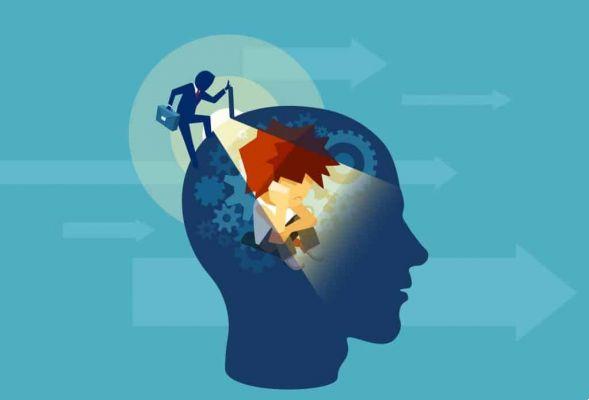“Freud explains!” Surely you must have read or heard this phrase around, right? But who was Freud and why would he be able to explain anything? Do you know any facts about the life of this man who is considered the Father of Psychoanalysis, a type of therapy?
We have prepared an article that explains Freud's origins, who he is, his main ideas, some famous quotes or phrases he said. And we also suggest how you can apply the knowledge produced by Freud in your daily life. Check out the article!
Who was Sigmund Freud?
Sigmund Schlomo Freud was born in 1856, in the Austrian Empire, territory that today corresponds to the Czech Republic. He died at age 83 in London, England, from cancer of the palate, which he tried to treat with more than 30 surgeries.
Freud was responsible for the development of Psychoanalysis, a theory about the functioning of the human psyche, which he also transformed into a clinical field and, consequently, into therapy. Despite what many think, Psychoanalysis is not an approach to Psychology, but a theoretical investigation independent of Psychology.
Little is known about the early years of Freud's life, because he destroyed much of the writing he did at that time. Interested in Charles Darwin's theories, he studied medicine at the University of Vienna. After dedicating a few years to scientific research, Freud worked in a hospital, having devoted himself to cases of hysteria or other neurological problems.

It was from 1886 that Freud began to treat some of his patients with what he called the “talking cure” or “cathartic cure”, in which he allowed his patients to speak freely and with few interventions about what they wanted. It was from there that Psychoanalysis was born, which made him respected and admired (as well as criticized, of course) all over the world. To understand more about Psychoanalysis, check out the next topics.
Contrary to what is thought of someone who “kicks the ball” into one of the most famous theories about the human mind, Freud never got rich. He had a modest financial life. Another thing that little is known about him is that he was Jewish and lost four of his five sisters in concentration camps in the years when Nazism reigned in Europe.
Freud lived in Vienna, Austria, from 17 to 82 years old, when he left for England to escape the Nazi regime. He died in London after years of suffering from cancer. During his lifetime, he gained famous adherents such as Carl Jung and Karl Abraham, as well as many other physicians and psychologists, but it was not until the last years of his life that his theories began to gain popularity outside medical circles to become practically part of the western culture.
Id, ego and superego for Freud
The most famous psychoanalytic theory among the many studies and proposals by Freud is perhaps that of the division of the unconscious. Trying to give a scientific air to Psychoanalysis, he proposed a model of division of the unconscious. Unconscious, for him, is the part of our psyche that we cannot access willingly, but that is always operating and influencing our behavior and our thoughts. According to Freudian theory, the unconscious would be divided into three parts: id, ego and superego.
• The id would be the set of primitive processes, a reservoir of desires and drives.
• The ego is the mediator, the balance that balances the id (our desires) and the superego (our concepts of morals and ethics).

• The superego is the part of the unconscious that is always in conflict with the id, because it represents our moral and ethical concepts and values.
A criticism that is made of Psychoanalysis as a whole, but especially of the theory of the unconscious and the division of the unconscious, is that none of this has been scientifically proven, which would classify Psychoanalysis as a pseudoscience, since it calls itself a science, but does not propose nothing with scientific methods.
Other ideas by Sigmund Freud
According to Freud, all or almost all human behavior is connected to the way we manifest and repress our sexuality. His theory explains that the development of sexuality takes place in five phases during childhood (oral phase, anal phase, phallic phase, latency period and genital phase). According to Psychoanalysis, in each of these phases a part of the baby's/child's body is more exercised, whether mouth or anus, and so on.
Another central thesis of Psychoanalysis is that most emotions and human impulses are hidden in the unconscious, so it is impossible to understand the exact roots of our desires and behavior, since they originate in a part of our mind that we do not have access to. . Still according to the theory, in addition to the conscious and unconscious mind, we have another part called the subconscious (or pre-conscious), responsible for retrieving information that we do not have access to often, but that we access at times when they are needed.

Psychoanalysis studies dreams and their meanings a lot. For Freud, dreams are a representation of our repressed desires. His most famous work even deals with dreams – “The Interpretation of Dreams”, published in 1899. This idea suggests that we do in dreams what we are forbidden (often by ourselves) to do in waking life, since it “overflows” into dreams.
Freud also proposed that melancholy was a type of pathology. According to him, melancholy affected the unconscious. For this reason, the individual affected by it is unable to identify the origin and reasons for their pain. The symptoms of this problem, according to the psychoanalyst, involve loss of self-esteem and suicidal impulses, although there is no loss or compromise of something concrete or physical. These are symptoms similar to those we associate with depression today.
Important phrases of Freud
We are made of flesh, but we must live as if we were made of iron.”
Christians often say that God does not give us a cross of a weight and size that we cannot bear, but we know that reality sometimes imposes more weight and difficulty on some people, making the journey difficult. And that's what Freud says in this sentence: despite being weak, life demands that we act as if we had impressive strength.
How strong a person is when they are sure of being loved!”
Love is one of the most powerful forces in life, capable of giving strength to anyone who is feeling weak. Words of affection, a hug, a kiss… How many forms of love can help us overcome problems and difficulties, making life lighter and more bearable! May we value love as something that helps us move forward!
The energetic and successful man is the one who succeeds in turning the fantasies of desire into realities.”
For Freud, success is synonymous with fulfilling your desires and fantasies, as long as, of course, the integrity of the other is respected and it is not necessary to attack someone - physically, emotionally or verbally - for this. So to be successful is to find the means and strength to achieve your dreams and desires.
Educate him as you like; in any case, you will educate him badly.”
Many fathers and mothers end up asking themselves: “Am I educating my child well”, but the truth, according to Freud, is that any education will be bad, because educating means instructing and enhancing, but also hindering, prohibiting and indicating paths, in instead of betting on the freedom of the children.

The progressive renunciation of instincts seems to be one of the foundations of the development of human civilization.”
How many things do we stop doing because we feel held back by people, life, the world, the system or whatever? Psychoanalytic theory helps us to see that, many times, we are prevented from fulfilling our desires not through our fault, but because the possibility of conquering them is really prevented, given the way the world and society are organized.
Religion is comparable to a childhood neurosis.”
Freud, who was an atheist, used to compare religion to one of the fanciful delusions we have in childhood, because having faith is, above all, believing without evidence, which is, after all, a fantasy. But he doesn't judge this as a negative thing, as we all have our fantasies and neuroses, whatever they may be.
Most people don't really want freedom, because freedom involves responsibility, and most people are afraid of responsibility.”
When we are allowed to do everything, then we need to act responsibly, because there is much more possibility of making mistakes than in situations where opportunities are reduced to us. So Freud says that many people just say they want freedom, but the truth is that few are prepared to deal with the responsibility that it implies.

Science is not an illusion, but it would be an illusion to believe that we can find elsewhere what it cannot give us.”
Sigmund Freud moved away, throughout his life, from everything that involved religion and spirituality, so much so that he broke with the famous Carl Jung precisely because Jung included spirituality in his studies. For him, therefore, not everything can be explained by science, but neither is it healthy to seek explanations outside of it.
Thought is the rehearsal of action.”
Just as a play goes through many rehearsal sessions before it is finally performed, our lives follow the same concept. Before we finally take any action, the thoughts and desires that direct us toward that action develop. Therefore, it is important that we think a lot before making decisions, because these thoughts help us to “rehearse” and avoid “improvisation” at the time of the “presentation”.
If you want to be able to bear life, be ready to accept death.”
It is said that life only has meaning because there is death, since, if it were possible for us to live infinitely, we would not be concerned with the urgency and need to achieve, since we would have all the time possible at our disposal. Therefore, according to Freud, it is necessary to accept death, so that life becomes possible and bearable.

How to apply Sigmund Freud's ideas
Before thinking about applying Freud's ideas in your life, think: do you agree with his theories or do you think, for example, the existence of the unconscious is absurd? If you find meaning in what he created, it is possible to apply some of his teachings to our lives.
For example, think about the last big decisions you've made in your life, whether those you planned or those you had to formulate at the last minute. Were they the result of structured and logical thinking or were they decisions you made without knowing how to explain how you arrived at them? Try to understand the moments when you act using your conscious mind and your unconscious to study it and try, even minimally, to understand it.
You may also like
- Freud explains the ego's defenses
- What is the ego? Know its facets!
- Understand the differences between Psychoanalysis, Psychology and Psychiatry!
- Psychoanalysis as a path to understanding the spiritual psyche
- Understand how the ego interferes in your life
When analyzing what you didn't do with the feeling you were consciously doing, think: what does your unconscious say about your desires? If our most hidden desires and fantasies are contained in the unconscious, what do yours say about you? What are you wanting deep down that is moving your life in the directions you've been following?
And if you really believe in everything that Freud taught you, think about your life dissatisfactions, your emotional problems and try to connect them to your sexual dissatisfactions or the desires and fantasies you have been repressing. With the help of a psychoanalyst, you can understand how your sexual desires are influencing your behavior.
Sigmund Freud was one of the most important (and controversial) figures in our history. What do you think of his theories? Do you think they are true? Do you believe in the existence and action of the subconscious? Share your impressions with us and ask the opinion of the people you live with!

























